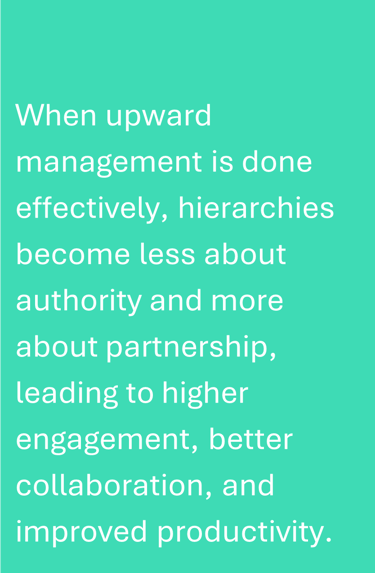Mastering the Art of Managing Up


I’ve noticed how much the challenge of managing upwards is showing up in coaching sessions.


When it comes to the workplace, relationships are everything. And while much attention is given to managing teams and peers, the concept of "managing up" often gets overlooked, or worse, misunderstood.
At first glance, the term "managing up" can sound a bit... manipulative. Are we talking about Apple for teacher? Playing politics? Actually, no. Managing up is about creating a strong partnership with your senior counterparts, understanding their goals and work styles, and adapting your approach to collaborate more effectively.
And here’s the twist: it’s not just the responsibility of the person managing up. Leaders have an essential role in encouraging and enabling this behaviour to create a culture of openness, trust, and innovation.
So, whether you’re managing up or the leader who wants to see more of this dynamic on your team, here are the key principles to consider.
For Those Managing Up
Managing up isn’t about seeking approval or blindly agreeing with your manager. It’s about working smarter together and understanding how your role fits into the bigger picture. Here’s how to take ownership of this process:
1. Learn Your Leader’s Style Every leader has their own way of working. Do they thrive on hard data, or do they prefer broader strategic insights? Are they detail-focused or big-picture thinkers? Observe their communication preferences, priorities, and decision-making patterns. The more you tailor your approach to their style, the more productive your collaboration will be. What assumptions are you making?
2. Communicate Proactively Don’t wait for your manager to ask for updates or solutions; stay ahead of the curve. Regularly share progress, highlight wins, and flag roadblocks with suggested solutions. This not only keeps them in the loop but builds trust in your ability to think critically and anticipate needs.
3. Be Transparent and Honest Building trust requires openness. If a project hits a snag, be upfront about it and come prepared with potential ways forward. Leaders value employees who can tackle challenges without covering them up.
4. Align with the Bigger Picture Your role contributes to larger organisational goals. Make sure your work and how you communicate it demonstrates how you’re moving the dial. Highlight not just what you’re doing, but why it matters to the team’s or company’s objectives.
5. Know When to Push Back Managing up isn’t about being a “yes” person. Constructive feedback is part of building a healthy working relationship. Approach challenging conversations with tact, fact and focus on shared goals and offer solutions rather than criticisms and you can encourage a relationship were you have each other’s back!
For Leaders Encouraging Upward Management
If you’re in a leadership role, building a culture where managing up is welcomed and encouraged can empower your team and culturally shape the entire organisation. Here’s how to make that happen:
1. Be Open to Feedback Create an environment where team members feel safe to voice their ideas or concerns. Encourage them to share their observations and listen actively. If they see that you value their input, they’ll be more inclined to engage in productive dialogue.
2. Set Clear Expectations Make it easy for your team to align with your goals by clearly communicating them. Share your priorities, decision-making process, and preferred ways of working. When people understand your style and objectives, they can tailor their approach more effectively. What does good look like?
3. Celebrate Initiative When someone proactively identifies a solution or suggests a better way forward, recognise it. Positive reinforcement can encourage others to adopt the same proactive mindset. What do you want them to do more of?
4. Maintain Psychological Safety If people feel judged or punished for speaking up, they’ll stop doing it. Build trust by showing that mistakes are opportunities to learn and that honest communication is valued over perfection.
5. Reflect on Your Triggers Recognise what behaviours frustrate you and make those preferences clear to your team. For example, if you dislike being interrupted when focused, share that upfront. Being transparent about your working style can help others navigate the relationship more effectively. What do you want instead?
The Core Principle of Managing Up
At its heart, managing up is about working smarter together. It involves:
Recognising Goals & Priorities
Understanding what success looks like from different perspectives.
Adapting to Work Styles
Some people prefer detail, others value brevity; some rely on intuition, others on data. Learning what works best fosters stronger collaboration.
Proactive Communication
Keeping key stakeholders informed without waiting to be asked.
Problem-Solving & Initiative
Identifying challenges and presenting solutions, not just raising issues.
Building Trust
Demonstrating consistency, honesty, and reliability in interactions.
Offering & Receiving Constructive Feedback
Creating a culture where feedback flows in both directions, leading to better decision-making and growth.
Aligning with Organisational Goals
Ensuring that individual contributions drive the broader mission forward.




